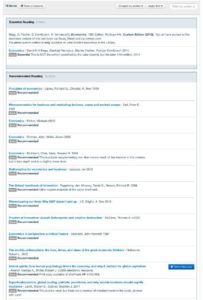After buying half of Ikea, and ticking off that list to ensure there is nothing you have forgotten to buy, you finally feel prepared for university. That is until a friend or parent asks you about what books you need to buy for your new modules. Then it dawns on you, what books do you need to buy for your modules?
The frantic search through your emails begins; checking and triple checking you haven’t missed the crucial email telling you that you were meant to read twenty books before term. With no luck you hastily move on to the Facebook fresher pages, “anyone else not received their reading list yet?”, with little to no response you preserve. The long search on Google commences and yet still nothing shows for 2016-17 first year reading list.
Finally you settle on looking at last years reading list and praying inside that nothing has changed too much. Upon first glance you notice that it is split into two sections per module; recommended and essential reading. Fortunately there is only one book listed as essential for each module, that wont be too expensive surely? A quick search on Amazon soon reveals that these five books are in fact very very expensive. Staring back at you is a basket total nearing £250 and a sudden panic as to how you are going to find the funds for these “essential” books.
Maybe I can ask for them as an early Christmas present?
Surely the library will have them in stock?
Perhaps I can find a second year to buy them off?
Yes that’s right, the second year who you will be eternally thankful to for the rest of your degree. Scrolling through one of the three “Official University of Sussex Freshers 2016-2017” pages you stumble across a few second years who have already begun selling, also begging, new freshers to buy their old textbooks.
These books are selling at the sorts of prices students can actually afford;£20 a book, two for £45 and even a bundle of six for £100. After browsing trying to find the best offers, you start to write a comment showing interest in the book, following a short hesitation you decide to post it. After getting a reply you now know if your search has been successful or if the quest continues. Either way this means that you will not have your books before term commences; ensuring no pre-university reading will be taking place.
Upon getting to your first lecture you nervously ask around to see if anyone has done any summer pre-reading. With a sigh of relief you realise quickly that no-one else has been given or found the reading list for this year and you instantly feel more relaxed. However there is always that one person… At the beginning of the introductory lecture you find out whether the books you’ve just bought from a second year are useful and are surprised to find out all but one out of six are. Before the panic can set in you are reassured that the book you thought was useless is still relevant but there is a free copy of the new book for this year online on KorText.
You finally feel ready and prepared for the semester ahead of you, all books bought and ready to read. Oh how wrong could you be. Then comes the elective! If you’re lucky you’ll only have one book if not you might have up to two or three books to purchase. The problem with an elective is that it is incredibly hard to find a second year student who has done the same elective as you and is willing to sell you the book at a reasonable price. The only resort is the university book shop or Amazon.

Now you’ve eventually got everything bought and paid for, your bank account significantly less than you wanted it to be, and you can relax a little bit. However, not for too long as you now have to work out how on earth you’re supposed to read the books and still manage to take it all in. Good luck with that!


